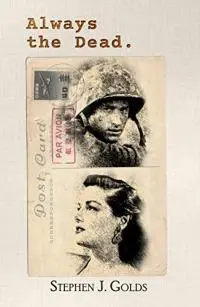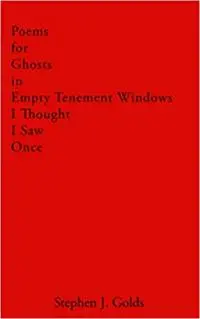Photo courtesy of the author
Stephen J. Golds might be in his late thirties, but that’s considered young in the old-curmudgeon guy dominated world of noir and crime-fiction. If he represents an “out with the old, in with the new” wave of upstart crime-scribes, he’s succeeding because of his instinct to dip into the old murky reservoirs and cleanse it with a fresh push forward. In fact, there’s something river-like about his narrative prose; a steady flow, accelerating beyond what is safe, into heart-pounding rapids, then washing the reader onto a muddy bank to reflect on what the hell just happened as another undercurrent slowly sweeps them away again.
If not his style, then consider his dizzying record of output. 99.9 % of everything he’s written this year — whether poetry, flash, short story, non-fiction — has been published. Last October saw the release of his debut novel, Say Goodbye When I’m Gone, (Red Dog Press) then a short three months later, we’re already getting his second one, Always the Dead (Close To The Bone) — and those are bookending his debut poetry collection, Poems For Ghosts In Tenement Windows I Thought I Saw Once. It’s inspiring (if not maddening) to observe.
Hell, he’s so unstoppable, we’re even treated to an off the cuff hard-boiled story through innocent eyes, embedded at the end of this interview.
Last year at this time you were virtually unknown. Now your debut novel, Say Goodbye When I’m Gone, is getting all sorts of very organic acclaim, which in turn is creating salivation for Always the Dead. Since you’re still starting out, what advice would you give to other writers just leaving the gates? Is there a strategy to your prolific output or just pure compulsion?
I hadn’t written anything for over a decade. To be honest, last year I hit rock bottom mentally. So, I started writing again — I really needed to do it for my mental health. Everything negative that happened to me or I felt I put into a story, a poem, or one of the novels. I just kept writing. After ten years, a lot of ideas, thoughts, feelings, and stories were pouring out of me and I was lucky enough to get the majority of them published. The crime writing community has been really supportive and helpful from day one, and I couldn’t have achieved what I have without them.
My advice to any new writers would be to be honest, be genuine in what you write. If you’re not going to be honest, don’t bother writing. The first person you should be writing for is yourself. Write for yourself and don’t stop. Anything that comes after is a bonus.
Both your books take place in the same universe, but Always the Dead focuses on the extrapolated, fictionalized story of the 1940s actress Jean Spangler disappearing — a true crime story you’ve since made your own. What attracted you to this very Hollywood mystery as a guy from across the pond?
 I’ve been obsessed with unsolved mysteries since I was a kid. Especially the cases of people who have disappeared without a trace. I would read about missing persons and spend weeks, obsessively absorbing every little detail I could find about their final hours. The disappearance of Jean Spangler was a particular case that stuck with me for many years because of its links to the California mob, famous actors, and the underbelly of Hollywood. She was really stunning. Her case had so many clues and potential leads, but the trail eventually went cold. I read everything I could about her and it really played on my mind because of the noir setting, people involved, and the period.
I’ve been obsessed with unsolved mysteries since I was a kid. Especially the cases of people who have disappeared without a trace. I would read about missing persons and spend weeks, obsessively absorbing every little detail I could find about their final hours. The disappearance of Jean Spangler was a particular case that stuck with me for many years because of its links to the California mob, famous actors, and the underbelly of Hollywood. She was really stunning. Her case had so many clues and potential leads, but the trail eventually went cold. I read everything I could about her and it really played on my mind because of the noir setting, people involved, and the period.
I’d also been playing with an idea for a novel about an Okinawa war vet working for the mob and suffering from Tuberculosis. And a further novel idea about a poisonous relationship between two lovers who are detrimental to each other but continue the poisonous relationship because it’s become an addiction.
When I read about the LAPD searching for a USAF lieutenant named Scott who had beaten Jean Spangler severely when she broke up with him, it was like a lightning bolt out of the blue, and I decided I’d marry all of the ideas together. Thus, Always the Dead was born. After years of research the novel came so fluidly, I wrote the rough first draft in a month.
Your character Scott Kelly is another conflicted protagonist, yet a unique one — a WW2 vet with extreme PTSD whose passion for finding his girlfriend Jean Spangler is often clouded with the horrors of war. At times, it’s as if his flashbacks are propelling him forward, yet the punishment he doles out to those in his way mirrors and informs the brutality of his military past. Was it a conscious decision to express these specific cycles of trauma often overlooked in men?
Cycles, limbo, and repetition are the main themes of Always the Dead. Aren’t all our actions today dictated by who we were yesterday? On the criminal side of the narrative, I wanted to explore how the shit that we do in life comes in cycles, and sometimes, no matter what you do, you can’t escape your sins, because they play and replay in your mind in the form of trauma, flashbacks and mental illness. Once you’ve opened the door to some things, that door can’t be closed again. You’ve let the demons in — now you have to party with them. On the military side of the narrative I wanted to demonstrate how conflicts/war can change someone. Completely rip the innocence from boys and make monsters of men. So many came back from the first and second world wars shattered mentally, and they suffered in silence because there was no support system in place for those kinds of mental wounds and traumas at that time. I wanted to explore how people deal with trauma. For some people, especially men, who feel as though we can’t openly talk about depression, mental health problems or trauma, there are sadly destructive coping mechanisms. For some it’s drugs, others it’s alcohol, others adultery and others in can be violence.
The books are so impeccably descriptive and well-researched, not only does it really “put you there,” but it almost makes it hard to believe a British guy who lives in Japan wrote them. What kind of research did you do? How much of it went into the book, or have you really just used this unsolved mystery as a springboard for original fiction?
I researched a lot. I especially researched Tuberculosis heavily in the way of medical reports and patient diaries from that time in the early to mid 1940’s. I studied old street maps and photographs of Los Angeles from the time. I was really serious about getting everything right because the story means so damn much to me personally that I needed it to be as authentic as it could be. The best it could be. All of the research I did went into the final product down to the smallest detail.
As for writing in American English, I’ve been teaching American English, living with it, using it daily for the last thirteen years, so that facet of the novel came the easiest. I actually prefer writing in American English. It feels much more succinct.
The novels feel relentlessly old school, like books written in the 40s, yet nothing that any publisher would have taken a chance on back then, given its “operatic violence” as Anthony Neil Smith so well put it. What is your attitude towards depicting violence graphically versus merely suggesting it to the reader’s imagination?
I find it interesting that people have said that Say Goodbye When I’m Gone and Always the Dead are violent novels, because I honestly went into writing both novels with the goal of them being about the characters and the stories first. Harking back to the 1940s/1950s where the violence was an afterthought or byproduct. I don’t think there’s any violence per se in both novels until the mid-way points. However, as in real life, sometimes things reach a point where violence is the only way to proceed to a certain goal or to escape. That interests me a lot. The fine point between violence and non-violence. I think everyone has experienced violence at some point in their lives and recognizes that it sometimes comes without warning or premeditation. That switch in atmosphere between peace and violence fascinates me as a writer, and I wanted to try and express that in the novels. The stories aren’t about violence but are about the choices violent men make. Anyone who commits violence doesn’t see themselves as violent. They can always justify it to themselves. No one ever thinks that they’re the bad guy. I feel that’s the most realistic view of violence and I wanted to include that in my novels.
Since you’re also a prolific poet, do you see writer's poetic instinct becoming a lost art when writing a novel in lieu of mechanics, plot structure, etc?
 I do think people are less likely to take poetic risks in their writing these days. They feel like they have to write a particular way to be accepted or to be valued. Beta readers warned me about repetition and certain structure choices in Always the Dead, but those choices are key to the story that I was trying to tell. It goes back to what I was saying about staying true to yourself and your story. Nothing good has ever come from a crowd’s opinion anyway.
I do think people are less likely to take poetic risks in their writing these days. They feel like they have to write a particular way to be accepted or to be valued. Beta readers warned me about repetition and certain structure choices in Always the Dead, but those choices are key to the story that I was trying to tell. It goes back to what I was saying about staying true to yourself and your story. Nothing good has ever come from a crowd’s opinion anyway.
I try not to get bogged down in thinking about the structure and mechanics of anything I write when I’m dealing with first drafts. Those aspects should come with the second draft because I feel if you go into anything thinking about all the rules, structure, all the clinical stuff, what you should and shouldn’t do, you’re going into it with a gun to your head. It’ll hinder your writing. I write what I want to write, how I want to write it first. Then I think about all the form and structure later. Same for poetry. I write the poem, then go back and redraft it once. That’s it. Otherwise it all becomes cold and mechanical. Takes the heart and emotion out of it.
Do you remember the moment that ushered in the world of noir/crime-fiction for you?
Noir found me on a Spring, Saturday morning at around 8:35. I was twelve years old.
A friend of mine had a kind of Saturday job helping out at the greasy-spoon cafe up the main street from my home. I’d wake up early, walk up there and he would give me a bacon sandwich and a coffee on the house.
This particular Saturday morning was a beautiful one. The sun was a golden yellow that glimmered from the morning dew and condensation on the pavements and parked cars. Walking up from the bottom of the council estate and the council houses the street gradually transformed classes. The houses got larger and prettier. As did the cars parked outside. Opposite the greasy-spoon cafe was a house that always caught my eye. It was a pure white and always had a maroon Jaguar parked outside. I had never seen who lived there but I imagined it was someone very rich. As I walked wondering how many pieces of bacon my friend would give me in my sandwich that day, three people came out of the house. Two large men and a woman. I can‘t remember the men too well. One was fat and bald and the other was skinny with a big nose and a ponytail. The woman caught my eye. She was beautiful. Not classy beautiful but that hard kind of beautiful. Jet black hair pulled tight into a ball on the top of her head. The darkest eyes. She was wearing adidas jogging bottoms and a tight t-shirt. As they walked past me to get into their car, another Jaguar, the woman glanced at me and made a disappointed kind of face. I don’t know why. We held eye contact for what felt like an hour but was probably closer to a couple of seconds.
They got into their Jag and drove away.
I was still looking over my shoulder at the shrinking car when I passed the White House and heard someone crying and moaning. It was an old guy. He was splayed half in his front door and half out in the pavement. There was a lot of blood. More than I’d ever seen. It was a deep red and it caught the sun. It was beautiful, too, in a jarring kind of way.
I thought he had fallen over and hurt himself. The stonewash blue jeans he was wearing were soaked through. He kept saying “They fucking shot me. They fucking shot me.” I kept asking him if he was okay. I didn’t know what to say or do. I put my hand on his back. Snot and tears were slick and glistening on his agonized face. I went across the street and told my friends boss that an old man had fallen over and was bleeding everywhere. Then I sat in the window eating my bacon sandwich watching the ambulance and police arrive. The woman’s face in my mind then and in my mind now.
Get Say Goodbye When I'm Gone at Bookshop or Amazon
Get Always the Dead at Amazon

About the author
Gabriel Hart lives in Morongo Valley in California’s High Desert. His literary-pulp collection Fallout From Our Asphalt Hell is out now from Close to the Bone (U.K.). He's the author of Palm Springs noir novelette A Return To Spring (2020, Mannison Press), the dispo-pocalyptic twin-novel Virgins In Reverse / The Intrusion (2019, Traveling Shoes Press), and his debut poetry collection Unsongs Vol. 1. Other works can be found at ExPat Press, Misery Tourism, Joyless House, Shotgun Honey, Bristol Noir, Crime Poetry Weekly, and Punk Noir. He's a monthly columnist for Lit Reactor and a regular contributor to Los Angeles Review of Books.







